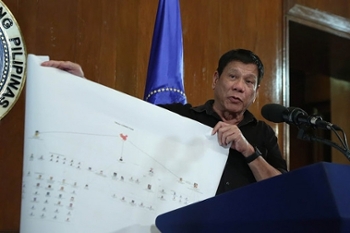Duterte and the Growing Rift with the United States
Primary Contributor: Noah Chaikof
Team Leader: Ma'Ailah Blackwood
On October 20th, 2016, Philippine President Rodrigo Duterte sounded political alarms when he announced during a China-Philippines business forum that he would disavow his country's 70-year military, diplomatic and economic alliance with the United States. These comments come amid the United States growing criticism of Duterte’s controversial anti-drug crackdown policy and the Philippines' growing relationship with the Chinese government. Duterte uttered other frightening statements during the business forum, even declaring “there are three of us against the world, China, Philippines, and Russia”. This sudden change in policy comes as a shock to the Obama administration, as the Philippines has historically been one of the United States’ closet allies. John Kirby, a high ranking state department spokesman, highlighted the United States' surprise with Duterte declaration of separation, saying “that the [United States] is going to be seeking an explanation about what exactly the president meant…”
This rift in Philippines-United States relations could not come at a worse time. The United States is currently squaring off against China over its territorial claims in the South China Sea, a conflict that the Philippines and United States previously stood together on. Duterte's separation could result in serious economic consequences for the Philippines. Recently, American firms have invested significantly in the growing Philippine electronic sector. Additionally, American business process outsourcing (BPO) has grown and contributes a significant amount to the overall Philippine economy (American BPO accounts for as much as 6-10% of the annual gross domestic product of the Philippines).
Another area where Duterte's volatile rhetoric and unpredictable policy moves are a concern is the impact they might have on investing, specifically the potential for his words to drive away investors. This is a serious concern, as Philippine stocks have fallen significantly since early August and the currency is at its lowest level against the dollar in seven years. However, analysts are still expecting a strong year for the one of Asia’s strongest economies. Chidu Narayanan, an economist at Standard Chartered, said “We expect the [Philippine] peso to rebound and end the year stronger than where it is right now.”
Since Duterte's declaration of his intention to separation the Philippines from the United States on October 20th, analysts have been looking at the potential benefit that closer relationships with China could bring to the Philippines. It has been reported that Beijing is offering through its state-owned China Railway Engineering Corporation to invest as much as $3 Billion in Philippine infrastructure programs in the next few years. Citi Bank Research estimates that even a $1 billion investment into the Philippine construction sector could result in 8.5% annual growth of this sector, leading to a Philippine GDP increase of up to 0.8%.
While Duterte surprised the United States, it may be a calculated political move that ultimately proves rewarding for the Philippines. What remains to be seen is whether Duterte has any further surprise announcements, as predicting his next political decision is all but impossible.


